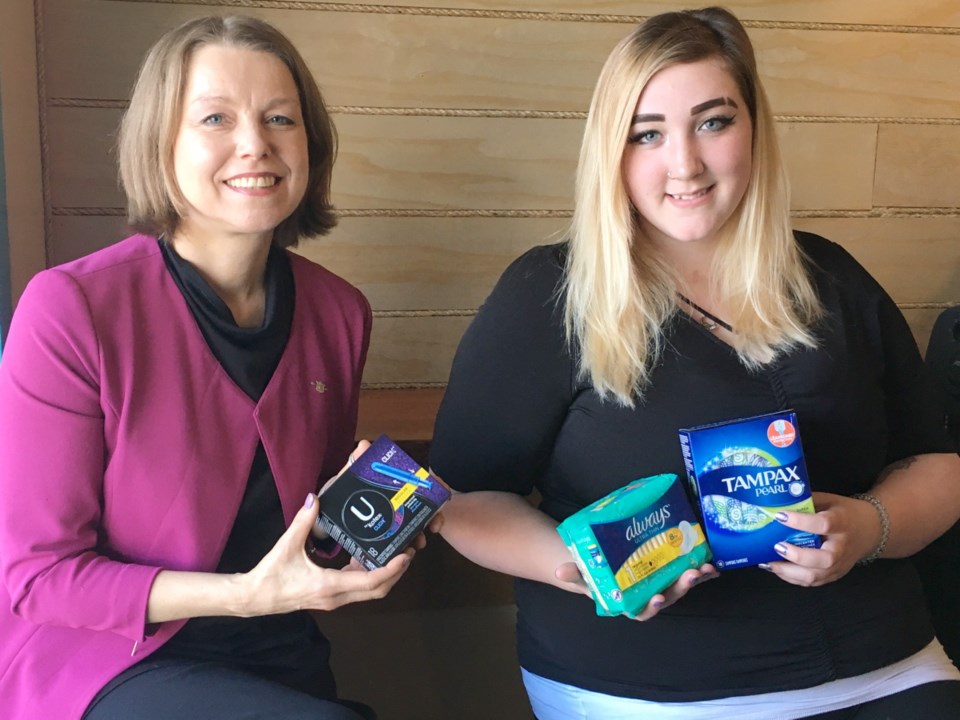Just over a week ago, the B.C. government announced that all schools would offer free menstrual products in washrooms by the end of 2019. When I heard this announcement, the first thing I thought was: “Finally.”
I am proud of our government for taking this step toward equality that will make a world of difference to many students in our school system. This initiative will support students who get their periods unexpectedly at school, and also students whose families might not be able to afford menstrual products.
Even though half of our population experiences menstruation, it still has a stigma and an embarrassment attached to it. I know it shouldn’t be embarrassing, but it still is, particularly in professional situations such as workplaces or educational institutions.
“It’s embarrassing because it’s highly personal,” said Mitzi Dean, parliamentary secretary for gender equity. This announcement has been a project that has been years in the making and Dean hopes it will help destigmatize periods.
People who menstruate have to plan their lives knowing that things will be disrupted for one week out of every month, and this includes preplanning and making arrangements on top of dealing with pain and discomfort.
It is also important for us to understand and acknowledge that transgender males and non-binary people menstruate, and we can’t just label this as a woman’s issue. Dean said this is being recognized by the government, and schools will have to have plans in place to support menstruating students who don’t use female washrooms.
I’ve known Dean for many years, and I interviewed her countless times when I was a reporter and she was executive director of a family-services agency. Never have we discussed menstruation in a personal or professional conversation. This past week, we had coffee with a high school student to talk about periods and this new announcement.
Cassidy Scott, 17, is a student at Belmont Secondary School and said it’s common for students to leave class in search of pads or tampons in an emergency. She is stopped by students at least three times a week asking for pads or tampons.
As Education Minister Rob Fleming said at the announcement, students miss classes, sporting events and extracurricular activities when they don’t have access to menstrual supplies.
“Having products available in the washroom is way more convenient than skipping class and texting people for a tampon,” said Scott. “Periods are embarrassing, and they shouldn’t be. I think having pads and tampons in the washrooms will be empowering.”
When I was in middle school, I made sure to have a backpack with many little pockets to hide menstrual products. Boys in class would go through backpacks and when they found a pad or tampon, they would wave them around to cause embarrassment. When I shared this story with Scott, she told me this is still happening in middle schools.
According to the government press release, one in seven students has missed school due to lack of menstrual supplies.
“I’ve gone home for sure because I couldn’t find a tampon,” said Scott. “Some girls at school only use pads because of their own comfort levels, and if they can only find tampons, they have to leave school for the day.”
I am certain that every person who menstruates has been caught off guard. Most of us have vehicles and the finances to run to the store quickly and deal with it. A 12-year-old student doesn’t always have that luxury, and with access to pads and tampons in school washrooms, this levels the playing field for students.
“Now, if students are stuck and require a product, they have to announce it to a staff member to get one,” said Dean, explaining some teens are too embarrassed to speak openly to their families about menstruation, let alone to staff at the schools.
People have been menstruating forever, and we seem to be stuck in a time of suppression when it comes to this. Putting menstrual products in schools will help students stay in class when menstruation comes on by surprise, it will bring students to class who can’t afford products and it will help normalize periods.
The government is committing $300,000 to assist schools to implement this, and this could be used for installing dispensers in washrooms.
Charla Huber is the director of communications and Indigenous relations for M’akola Group of Societies.



